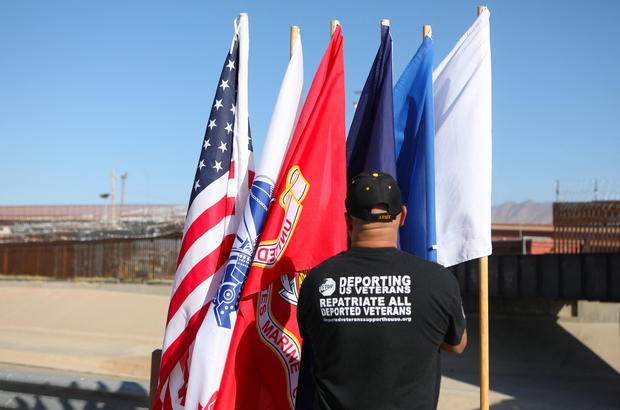The Biden administration has directed Immigration and Customs Enforcement (ICE) agents to generally refrain from seeking the deportation of U.S. military veterans or service members and their immediate family members, according to a directive published on Tuesday.
In a May 23 memo, interim ICE head Tae Johnson instructed the agency’s deportation agents and prosecutors to consider prior U.S. military service as a “significant mitigating factor that weighs against” placing immigrants in deportation proceedings.
If an immigrant veteran is eligible for U.S. citizenship because of his or her service, ICE officials “should generally not take civil enforcement actions against the noncitizen, absent significant aggravating factors,” Johnson wrote in his directive.
Johnson said ICE will not seek to deport active-duty U.S. service members, “absent significant aggravating factors present in the case.” Any decision to place veterans or service members in deportation proceedings must be approved by top ICE officials at local offices, Johnson added.
The May 23 directive also requires ICE agents and prosecutors to consider refraining from issuing deportation orders against parents, spouses or children of U.S. service members or veterans, directing them to seek approval from agency leaders before taking enforcement actions against this group.
Under the new policy, ICE will need to ask all immigrants it processes whether they have served or are serving in the U.S. military, and whether they have immediate family members who are U.S. veterans or service members.
For decades, deportation agents at ICE and its now-defunct predecessor, the Immigration and Naturalization Service, have been instructed to consider military service when deciding whether to seek the deportation of an immigrant.
But a 2019 report by the Government Accountability Office, a congressional investigative agency, found that ICE did not properly track cases of veterans it deported or placed in deportation proceedings, partly because it did not require agents to ask immigrants about military service.
HERIKA MARTINEZ/AFP via Getty Images
In most cases, noncitizens must be permanent U.S. residents to serve in the armed services. While U.S. law places immigrant service members on an expedited path to U.S. citizenship if they meet some requirements, it also allows ICE agents to arrest and deport legal permanent residents if they are convicted of certain crimes, regardless of their military service.
Crimes that make legal permanent residents deportable include serious ones like homicide and sexual assault, as well nonviolent offenses, such as drug-related convictions.
Johnson’s memo instructs ICE personnel to consider a veteran or service member’s years of service, deployment in a conflict zone, wartime medals, the type of discharge, any injuries suffered in battle, post-traumatic stress disorder or sexual trauma during service, court martial proceedings and other factors when determining whether to issue a deportation order against them.
The analysis, Johnson wrote, should also consider the type of criminal convictions, the circumstances surrounding them, the sentences and “any evidence of rehabilitation.”
Johnson’s memo is the latest in a series of Biden administration policies that have narrowed the groups of immigrants subject to ICE arrest and deportation. Under President Biden, ICE ended mass worksite arrests and instructed agents to refrain from detaining certain groups, such as pregnant women and victims of serious crimes.
Current rules approved by Homeland Security Secretary Alejandro Mayorkas last fall direct ICE agents to focus on arresting and deporting migrants who recently crossed the U.S.-Mexico border illegally, immigrants with serious criminal convictions and those deemed to endanger national security.
In his September 2021 memo, Mayorkas said an immigrant’s military service or that of an immediate family member should prompt ICE agents to consider declining an arrest.

